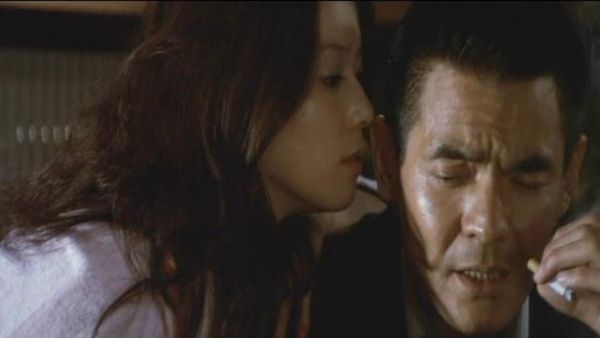Eye For Film >> Movies >> The Boss's Head (1975) Film Review
The Boss's Head
Reviewed by: Jennie Kermode

Officially a sequel to New Battles Without Honor And Humanity, but with nothing in common with it beyond the presence of Nobuo Kaneko as ageing patriarch Mr Yamamori, The Boss' Head tells a sprawling story of conflict over trade routes leading in and out of southern Japanese island Kyushu, and of the personal conflicts that complicate it. Initially paralleling the preceding film, it follows yakuza chancer Kuroda (Bunta Sugawara), just released from prison, as he tries to reintegrate himelf into gang life. First on his mind is claiming the reward due him after taking the fall for Kusunoki (Tsutomu Yamazaki), the son-in-law of the powerful Owada clan boss. But Kusonoki has squandered his wealth on heroin and nobody seems willing to take responsibility for Kuroda's money.
As the plot thickens, Kuroda finds that not only is he penniless but his life is in danger - a rumour that he may be invited to marry the boss' daughter after Kusunoki is done away with makes him a target for rival Aihara. But Aihara is entangled with a dangerously seductive woman who is considered bad news because all her former lovers have died (after being shot which, given that she didn't do any of the shooting, seems a bit unfair). Is his time about to run out too?
There is a lot more substance here than in the previous film and director Kinji Fukasaku seems to have settled into his groove, focusing on the kind of scenes where he is strongest. A spectacularly messy, non-linear car chase near the end makes the most of his talent as an action director, and he's a master of the crowd scene, with busy meetings in crowded bars full of revealing detail. Although one can't shake the feeling that he's repeating himself, the result is entertaining enough.
The film is of historical interest because of its portrayal of heroin addiction, which had rarely been addressed in Japanese cinema before. It's a raw and unflinching take, and also provides some great material for Meiko Kaji as the wife who still sees the man her husband used to be but is struggling to tolerate his abuse. There's potent social comment here because the film makes the point that a successful man can fall prey to addiction, which had preiously been shown, when it was shown at all, as something that happened only to people already considered to be hopeless cases.
Although the film is an ensemble piece, the central conflict between Kuroda and Aihara (though they share relatively little screen time) provides focus and cohesion as well as a driving narrative that helps to anchor the rambling story. The eventual resolution is as bloody as you'd expect, but it's the management of tension along the way that is the film's strength.
Reviewed on: 21 Aug 2017
















